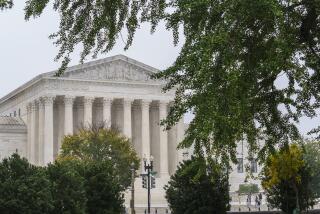Obscenity Conviction Thrown Out
- Share via
COLUMBUS, Ohio — In a victory for free-speech advocates, an appeals court Thursday threw out the guilty plea of a man imprisoned for writing fictitious stories in which he fantasized about molesting and torturing children.
Lawyers specializing in the 1st Amendment believe Brian Dalton was the first person in the U.S. successfully prosecuted for child pornography that involved writings, not images.
The stories, which prosecutors say were never acted on, were about three children, ages 10 and 11, being caged in a basement, molested and tortured. The journal was so disturbing that grand jurors asked a detective to stop reading after about two pages.
Dalton, 24, of Columbus pleaded guilty in July 2001 to pandering obscenity involving a minor, which falls under Ohio’s pornography law. He later asked to withdraw the plea so he could fight the constitutionality of the law, but Franklin County Common Pleas Judge Nodine Miller refused. American Civil Liberties Union attorneys then appealed.
Ohio’s 10th District Court of Appeals in Columbus sent Dalton’s case back to the Franklin County court, ruling that Dalton received ineffective legal assistance at trial.
His attorneys had asked the appeals court to dismiss the case on the grounds that prosecuting someone for their private thoughts and writings violates free-speech protections. Benson Wolman, an attorney representing Dalton, said Thursday’s ruling gives Dalton a chance to make that case before a trial court judge.
Wolman also said he will seek Dalton’s release from prison.
“Now we’ll be able to directly address the constitutional issue, which was not done at the trial level before,” Wolman said.
Franklin County Prosecutor Ron O’Brien said he hadn’t decided whether to appeal to the Ohio Supreme Court or put Dalton on trial again.
Dalton was sentenced to seven years in prison, plus 4 1/2 years from a 1998 child pornography conviction because he violated probation by possessing the journal.
The Washington, D.C.-based Family Research Council, which fights child pornography, said it believed a case could still be made against Dalton “in the mere creation and possession of child pornography writing,” said spokeswoman Kristin Hansen.
First Amendment advocates welcomed the decision.
“I was just startled by the original development of the case, the notion that what are essentially thoughts or one’s tortured imagination could become the basis for prosecution,” said Robert M. O’Neil, director of the Charlottesville, Va.-based Thomas Jefferson Center for the Protection of Free Expression.
The U.S. Supreme Court has said that child pornography can be prohibited. However, the court in April 2002 struck down most of a 1996 law to ban virtual child pornography.
More to Read
Sign up for Essential California
The most important California stories and recommendations in your inbox every morning.
You may occasionally receive promotional content from the Los Angeles Times.












